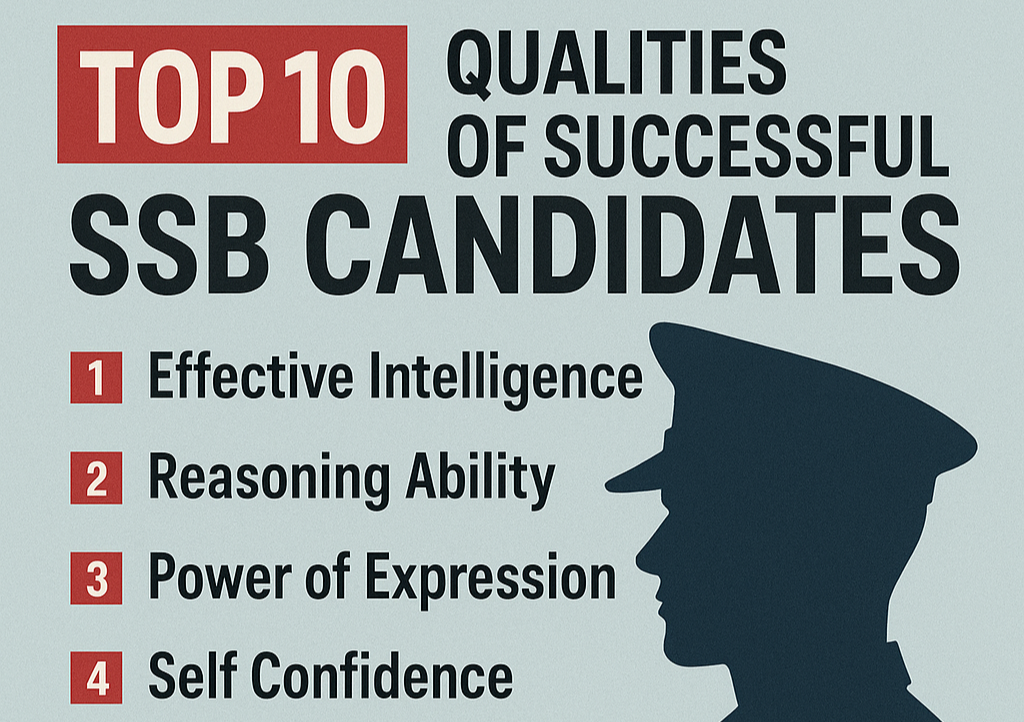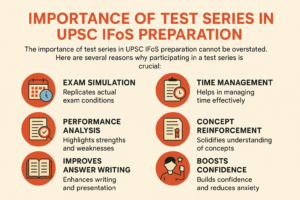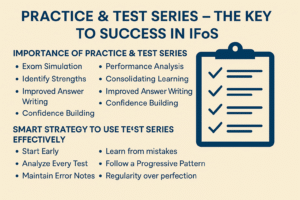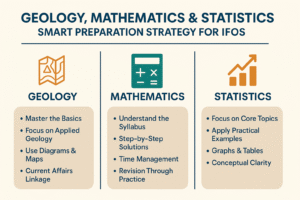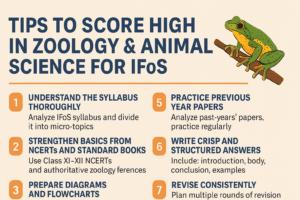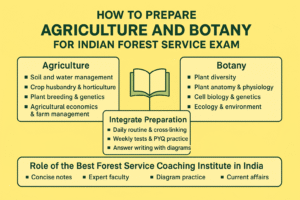Success in the SSB (Services Selection Board) interview is not just about intelligence or academic knowledge—it’s about personality, leadership, clarity of thought, and behavior under pressure. Thousands of aspirants appear every year, but only a few get recommended. What separates them from the rest?
In this article, we will explore the top 10 most essential qualities that successful SSB candidates possess and how you can develop them to improve your chances of selection.
1. Effective Communication Skills
Being able to communicate clearly, confidently, and concisely is key in all stages of SSB—from group discussions to personal interviews.
How to develop:
Practice speaking in front of a mirror or with friends
Engage in debates, extempore, and GDs
Improve vocabulary and expression
2. Self-Confidence
SSB assessors value candidates who believe in themselves. Confidence reflects in your body language, tone, and decisions during tasks.
How to develop:
Set small achievable goals and track your success
Practice public speaking
Stay physically and mentally fit
3. Leadership Qualities
The Armed Forces look for natural leaders who can take initiative, motivate others, and act responsibly.
How to develop:
Participate in team activities and take up responsibility
Observe and learn from great leaders (real or fictional)
Make decisions and take accountability for outcomes
4. Social Adaptability
An officer must be able to work harmoniously with people from diverse backgrounds. Social adaptability helps during group tasks and interactions with batchmates.
How to develop:
Be open to new perspectives
Build strong interpersonal relationships
Practice empathy and active listening
5. Positive Attitude
Whether it’s a tough obstacle in GTO or a challenging situation in SRT, your optimism and positive mindset will be noticed.
How to develop:
Replace negative thoughts with constructive ones
Practice gratitude and solution-based thinking
Focus on learning rather than fear of failure
6. Mental Alertness
SSB tasks require quick thinking, especially during SRT, group planning, and individual obstacles.
How to develop:
Solve puzzles, riddles, and logical reasoning questions
Stay updated with current affairs and general knowledge
Develop a curious and analytical mind
7. Emotional Intelligence
Being aware of your own emotions and those of others is essential to stay calm under pressure and make thoughtful decisions.
How to develop:
Practice mindfulness and meditation
Observe how you react under stress and try to control it
Learn to respond, not react
8. Determination and Resilience
Candidates who keep going despite setbacks show the kind of grit and determination required in the forces.
How to develop:
Set long-term goals and don’t quit
Learn from failures and bounce back stronger
Cultivate self-discipline
9. Physical Fitness
Officers are expected to be fit and active. Many GTO tasks test stamina, coordination, and physical strength.
How to develop:
Include running, push-ups, squats, and stretching in your daily routine
Play outdoor team sports
Maintain a healthy diet and sleep schedule
10. Clarity of Thought and Purpose
Successful candidates know why they want to join the Armed Forces. This reflects in their answers and attitude.
How to develop:
Reflect deeply on your motivation and long-term goals
Be honest in your self-description
Practice writing personal intros and answers to “Why do you want to join the defence forces?”
SUMMARY TABLE: TOP 10 QUALITIES
| Quality | Why It Matters in SSB | How to Develop |
|---|---|---|
| Communication Skills | For GD, Interview, and Group Tasks | Practice speaking, join clubs |
| Self-Confidence | Reflects in decisions and performance | Track wins, stay healthy |
| Leadership | Officers lead in all situations | Take initiative, handle group projects |
| Social Adaptability | Team spirit and bonding | Respect others, engage in teams |
| Positive Attitude | Helps in stress handling | Think constructively, stay hopeful |
| Mental Alertness | Quick thinking in tasks | Practice reasoning, stay curious |
| Emotional Intelligence | Handle pressure, relate with others | Be mindful, reflect on emotions |
| Determination | Shows dedication to goal | Don’t give up, learn from mistakes |
| Physical Fitness | Required for field tasks | Daily exercise, balanced routine |
| Clarity of Purpose | Drives motivation and focus | Know your “why,” prepare your narrative |
FREQUENTLY ASKED QUESTIONS (FAQ)
Q1: Are these 10 qualities tested directly in SSB?
No, they are observed indirectly through tasks like TAT, WAT, GTO, and interviews. Assessors look for these traits in your actions and responses.
Q2: Can I develop these qualities in a short time?
Yes, with consistent effort, most candidates can improve significantly within 2–3 months.
Q3: Do coaching academies help in developing these qualities?
Coaching helps in guidance, but developing these traits requires self-awareness, discipline, and daily practice.
Q4: What happens if I lack in 1–2 areas?
That’s okay. SSB focuses on overall personality. You don’t need to be perfect, just well-balanced and trainable.
Q5: Which quality is most important?
No single quality is most important. However, clarity of purpose, confidence, and communication often make a strong impact.
Conclusion
The top 10 qualities of successful SSB candidates aren’t just about performing well—they define what it means to be a future officer. If you’re an aspiring candidate, start developing these traits today. Remember, SSB is not about mugging up answers—it’s about being the best version of yourself.
Start now. Reflect. Practice. Improve. The Armed Forces are not looking for perfection, but potential.

